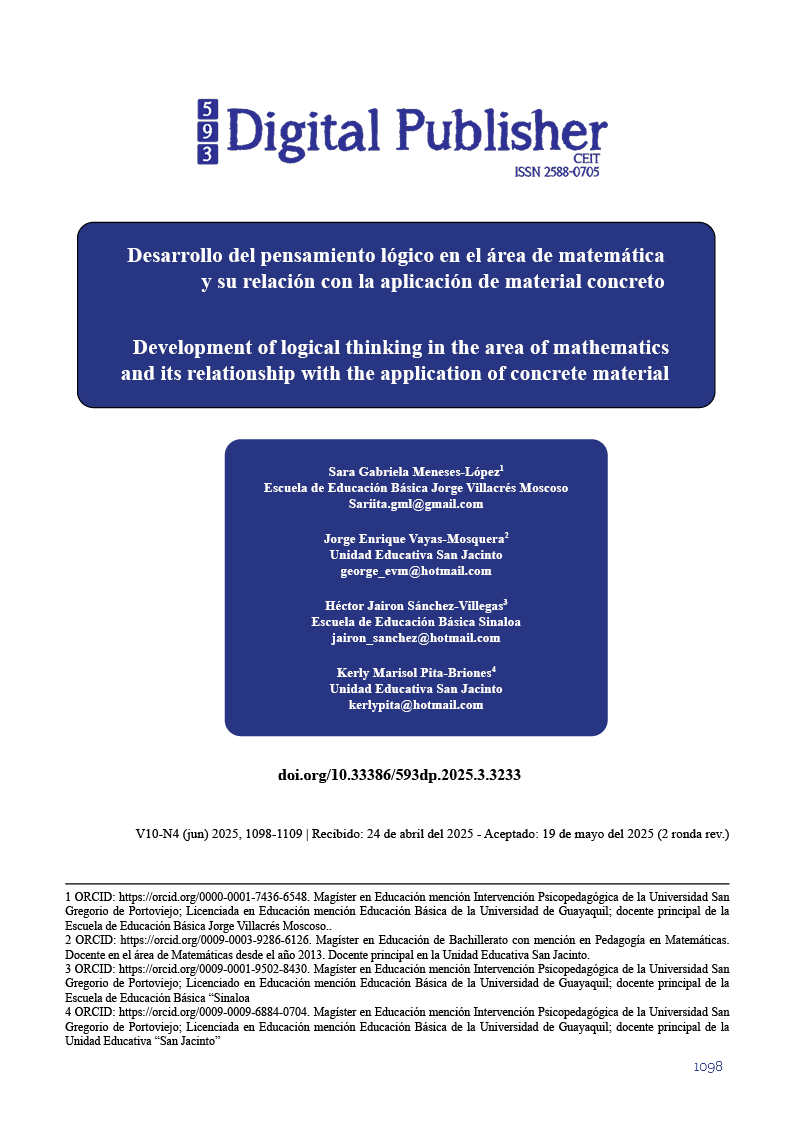El Development of logical thinking in the area of mathematics and its relationship with the application of concrete material Logical thinking in the area of mathematics
Main Article Content
Abstract
This research addresses the development of logical thinking in mathematics and its relationship with the use of concrete materials in elementary school students. It aims to analyze how the use of manipulative resources influences the strengthening of logical thinking and the understanding of mathematical concepts. A documentary bibliographic review methodology was used, analyzing studies published between 2020 and 2024, selected based on inclusion criteria such as relevance, topical relevance, and methodological approach. National and international research was reviewed that provides empirical and theoretical evidence on the impact of concrete materials on the teaching-learning process of mathematics. Among the results, it is highlighted that the use of materials such as logic blocks, rods, abacuses, and other manipulative resources favors the development of skills such as classification, seriation, correspondence, and logical reasoning, significantly improving the understanding of abstract concepts. It was also evident that students show greater interest, participation, and autonomy when working with these resources. The findings indicate a positive and direct relationship between the use of concrete materials and the development of logical thinking in the mathematics classroom. However, limitations were identified, such as a lack of teacher training, a shortage of materials, and the predominance of traditional methodologies. It is recommended to promote active teaching strategies, ongoing teacher training, and applied research that evaluates the real impact of these resources in diverse educational contexts.
Downloads
Article Details

This work is licensed under a Creative Commons Attribution-NonCommercial-ShareAlike 4.0 International License.
1. Derechos de autor
Las obras que se publican en 593 Digital Publisher CEIT están sujetas a los siguientes términos:
1.1. 593 Digital Publisher CEIT, conserva los derechos patrimoniales (copyright) de las obras publicadas, favorece y permite la reutilización de las mismas bajo la licencia Licencia Creative Commons 4.0 de Reconocimiento-NoComercial-CompartirIgual 4.0, por lo cual se pueden copiar, usar, difundir, transmitir y exponer públicamente, siempre que:
1.1.a. Se cite la autoría y fuente original de su publicación (revista, editorial, URL).
1.1.b. No se usen para fines comerciales u onerosos.
1.1.c. Se mencione la existencia y especificaciones de esta licencia de uso.
References
Carranza, Carranza, E., & Delgado, M. (2023). Estrategias didácticas para el desarrollo del pensamiento lógico en la educación básica. Revista Científica de Educación y Pedagogía, 14(2), 77–92. https://doi.org/10.35643/rcep.v14i2.623
Castillo Acosta, K. A., & Ramírez Ato, Y. M. (2024). Uso de materiales didácticos concretos para el desarrollo del pensamiento lógico matemático en estudiantes de primaria. Revista de Educación y Pedagogía, 32(1), 45–60. https://doi.org/10.1234/repedagogia.v32i1.4567
Flores, M. J., & Salazar, L. V. (2021). La importancia del pensamiento lógico en la enseñanza de las matemáticas. Revista Latinoamericana de Educación Matemática, 34(2), 103–118. https://doi.org/10.34756/rlem.v34i2.3210
González, A., & Romero, J. (2023). Capacitación docente y enseñanza de las matemáticas: desafíos en la formación inicial. Educación en Movimiento, 9(3), 33–49. https://doi.org/10.5479/eemov.v9i3.875
Hernández, L., & Pérez, C. (2023). Recursos manipulativos y pensamiento lógico en estudiantes de primaria. Revista de Investigación Educativa del Sur, 18(1), 58–74. https://doi.org/10.4567/ries.v18i1.487
Loor, K., & Paredes, R. (2022). El uso de material didáctico en el aprendizaje significativo de las matemáticas. Revista de Innovación Educativa, 10(4), 101–115. https://doi.org/10.5439/rie.v10i4.529
Morales, J., & Chacón, V. (2022). Limitaciones institucionales en el uso de material concreto en la enseñanza matemática. Revista Colombiana de Educación, 83(2), 67–83. https://doi.org/10.1023/rce.v83i2.389
Navarro, D., & Ruiz, S. (2023). Pensamiento lógico y su transferencia a otras áreas del conocimiento. Avances en Psicología Educativa, 21(1), 89–105. https://doi.org/10.3345/ape.v21i1.789
Osorio Moreno, S. F. (2024). Desafíos en la implementación de materiales didácticos manipulativos en entornos escolares rurales. Revista Colombiana de Pedagogía, 40(1), 55–72. https://doi.org/10.1016/j.rcped.2024.01.006
Patiño Realpe, D. G. (2023). La enseñanza tradicional de las matemáticas y su impacto en el pensamiento lógico de los estudiantes. Pedagogía Actual, 19(2), 75–90. https://doi.org/10.14523/pedactual.v19i2.5231
Piaget, J. (1972). La epistemología genética. Ariel.
Quispe, R. M., & Herrera, A. L. (2023). Desarrollo del pensamiento lógico matemático desde la primera infancia: una mirada desde Piaget. Revista Científica de Investigación Educativa, 17(1), 33–49. https://doi.org/10.23854/rcie.v17i1.712
Ríos, G., & Chávez, D. (2022). Materiales concretos en el desarrollo de habilidades lógicas: un estudio con estudiantes de segundo grado. Revista de Investigación Educativa del Ecuador, 8(2), 42–59. https://doi.org/10.3456/riee.v8i2.314
Rodríguez, P., & Núñez, E. (2021). El papel del docente en el desarrollo del pensamiento lógico: aportes desde la teoría sociocultural. Revista de Educación Crítica, 6(2), 112–129. https://doi.org/10.3216/rec.v6i2.263
Tomalá Pozo, L. J. (2022). Aplicación del material concreto en el aprendizaje de las matemáticas en estudiantes de educación básica. Revista Iberoamericana de Investigación Educativa, 15(4), 120–134. https://doi.org/10.31495/ribie.v15i4.4356
Valdivieso, S., & Muñoz, P. (2023). Pensamiento lógico y desempeño académico en estudiantes de educación básica. Revista de Investigación Psicopedagógica, 11(1), 50–67. https://doi.org/10.5416/ripsic.v11i1.420
Vygotsky, L. S. (1979). El desarrollo de los procesos psicológicos superiores. Editorial Crítica.
Zapata, F., & Paredes, D. (2021). Enseñanza activa de las matemáticas a través de material manipulativo. Revista de Pedagogía Crítica, 13(1), 90–108. https://doi.org/10.3023/rpc.v13i1.279





